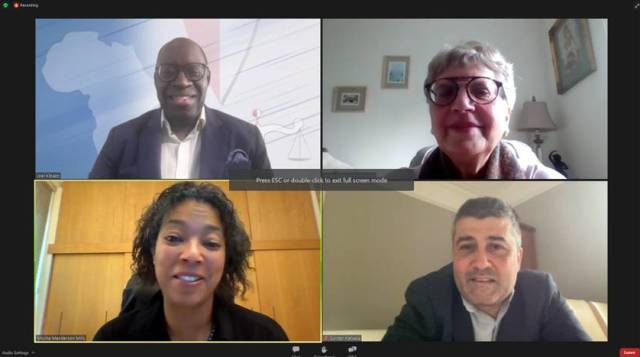 (l-r clockwise) Joel Kibazo, Usha Prashar, Sunder Katwala and Mischa Manderson Mills.
(l-r clockwise) Joel Kibazo, Usha Prashar, Sunder Katwala and Mischa Manderson Mills.
Next year’s Commonwealth Games will undoubtedly raise the profile of the Commonwealth. How do you take this opportunity to begin a wider, more nuanced and continuing debate about the modern Commonwealth?
This question lay at the heart of a discussion on 26 October on Black Lives and the “New” Commonwealth in Post-War Britain: Decolonisation, Race and Justice, organised jointly by The Commonwealth Round Table, the University of Birmingham and the Association of Commonwealth Universities. It is part of a series aimed at using the Commonwealth Games to initiate a debate on the historical and contemporary relevance of the Commonwealth.
Event chair, communications specialist, broadcaster and journalist Joel Kibazo, asked panellists about their expectations for telling the “Commonwealth story” during the Games, scheduled to take place in Birmingham in July and August 2022.
Crossbench peer Baroness Usha Prashar said that the Games would push the profile of the Commonwealth. She said that the key would be to prevent discussion about the Commonwealth slipping onto the back burner after the Games and to use the attention to achieve a more long term approach to teaching the history of the Commonwealth, making it part of the school curriculum.
Former Commonwealth Secretariat and Commonwealth Youth Council official, Mischa Manderson Mills, described the multi-cultural nature of the Games as a “great opportunity” and a “great stepping stone” to discuss the Commonwealth. “This is a way of showing that the modern Commonwealth has currency and agency,” she said.
Equality and diversity consultant and Director of British Future, Sunder Katwala, described the Games as an opportunity to achieve a “sustainable conversation”. He pointed out that the 75th anniversary of the arrival of the Empire Windrush also allowed a national conversation beyond the debate over the removal and putting up of statues. Rather than taking down statues, he suggested more should be put up. He said that the UK and the Commonwealth should be creating “a space for this dialogue”. He suggested “using the moment to sustain something that is lasting”.
Not a pleasant history
The panellists agreed that the history of the British Empire and the modern Commonwealth meant that the UK experience was different to America’s, even though the US-inspired Black Lives Matter (BLM) movement had brought to the surface underlying issues across the world. They discussed what Sunder Katwala called “a British version” of the BLM moment.
Baroness Prashar used her experience on the former UK Race Relations Board to call for more sensitive ways to engage in the discussion on statues, race and history. She said that the gathering of best practice examples, such as the way Barbados had used national discussion to decide what to do with the controversial statue of Lord Nelson in its capital, was helpful. “How do we reach people about where we are, how we got here,” Baroness Prashar asked.
On the Barbados example, Ms Mills said that “tearing down a statue doesn’t erase what has happened”. She said that a complete education included looking fully at the history of empire. Referring to what she called a previously “gently amnesiac” approach to the difficult parts of Britain’s history, she called for a nuanced discussion on decolonisation and race to achieve a gentle rather than a violent reckoning. “Not all of it [British history] is pleasant,” she said, adding that no country’s story is without blemish.
Windrush as a marker
Mr Katwala said that, in the past, it had been easier to teach British history as “the Tudors and the world wars”. He said there had been a lack of confidence about teaching the story of empire. He pointed to Windrush as a “symbol of the start of Commonwealth migration” but pointed out that Windrush had not been where the story had started and that the story continued today.
Jamaican-born, British citizen, Mischa Mills, said that “Commonwealth people helped shape modern Britain”.
The discussion on decolonisation is one of a series of events in the countdown to next year’s Commonwealth Games, aimed at providing the launch pad to promote an understanding of the modern Commonwealth brand.
Black Lives and the ‘new’ Commonwealth discussion video:
Related articles:
Leaving behind the legacy of race to forge a modern Commonwealth brand – Part one in this series



